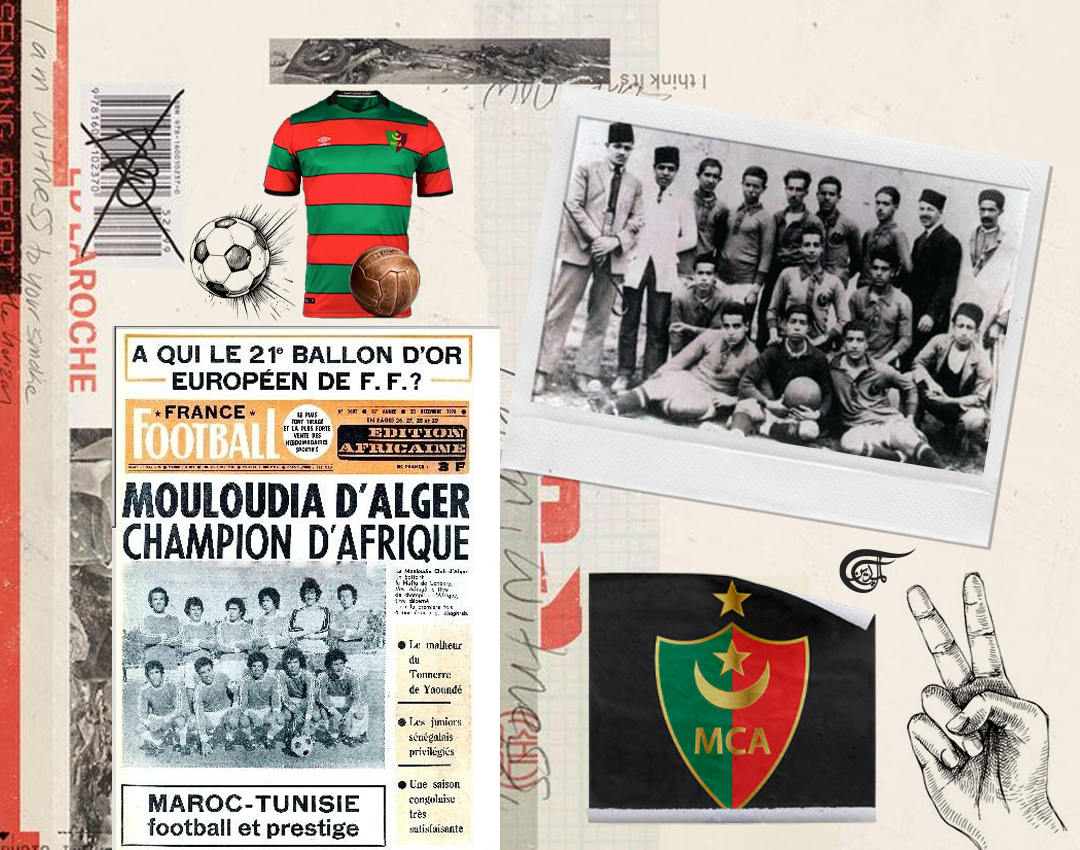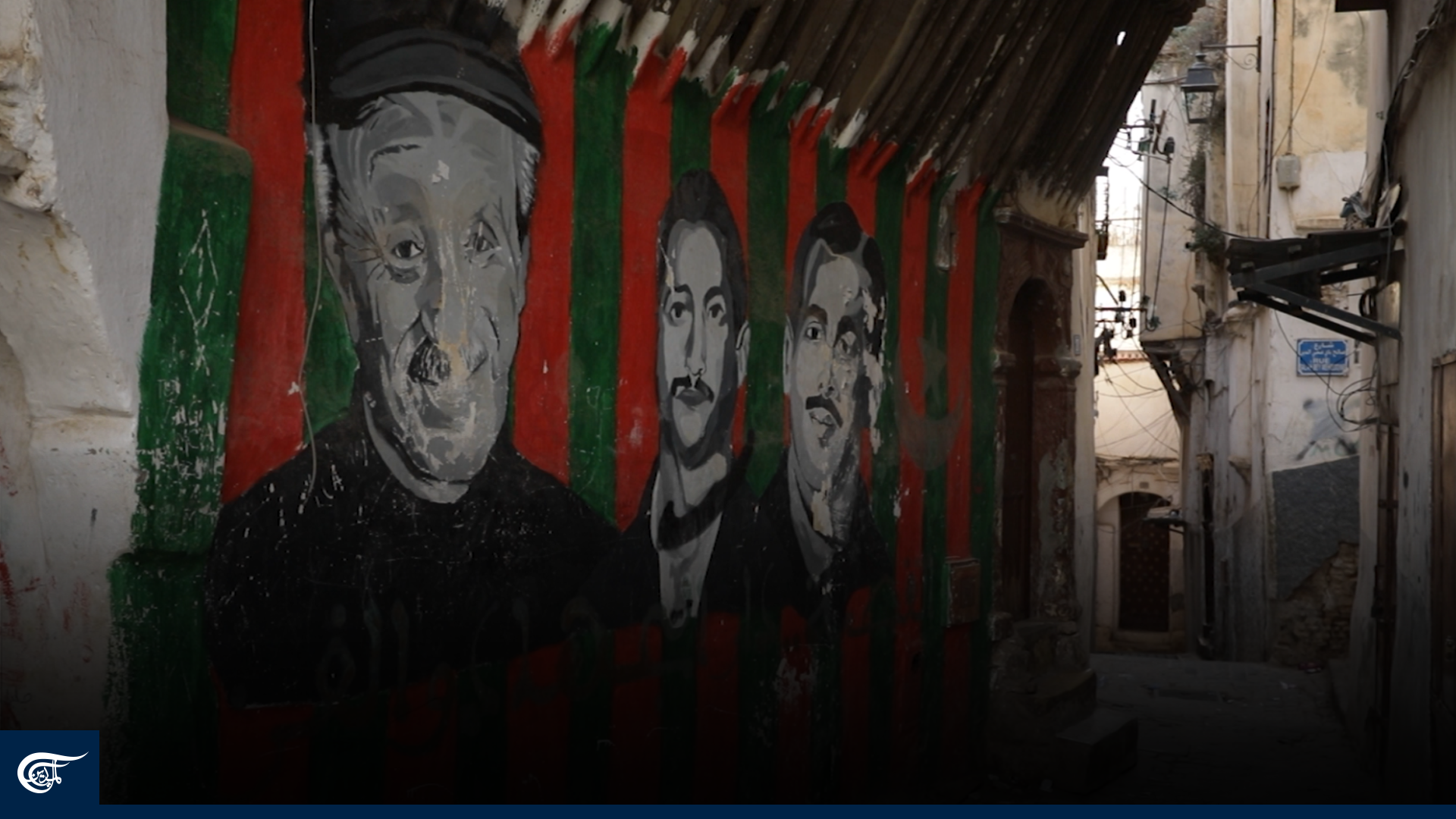Mouloudia Club d'Alger: 102 years of Algerian revolutionary football
102 years since its establishment, the history of Mouloudia Club d'Alger is proof of how sport can be a weapon to fight colonialism and support rightful causes.
The goal behind the establishment of MC Alger, known as Mouloudia Club d'Alger, was not only to create a football club but also to fight French colonialism.
While 17-year-old Algerian boy Abdel Rahman Auf was passing by a square in the Algerian capital’s Kasbah neighborhood where some children were playing football, a group of French colonial soldiers passed by the children, looking at them with contempt and mocking them.
“Look at the Arab Princes’ Park,” one French soldier told another, in reference to the famous Princes Park stadium in Paris.
The soldier’s words stunned Abdel Rahman and affected him greatly, making him feel insulted. It was this incident that pushed the young Algerian to contemplate establishing an Algerian football club that would serve as a symbol of anti-colonialism and a source of national pride for the Algerian people.
On August 7, 1921, Auf and his friends from the old Kasbah neighborhood and Bab El Oued met at the Benachere café, and he proposed to them the idea of establishing the first Algerian Muslim club to compete against French colonial clubs; a proposal that was widely welcomed.
The process of coming up with a name for the club was very difficult before someone in the café unexpectedly shouted “Mouloudia”, in reference to Al-Mawlid, the birth anniversary of Prophet Mohammad, which Algeria was about to celebrate. In addition, the colors of Islam, green and red, were chosen as the official colors of the team.
Auf then spent two to three years going through the necessary procedures for the club’s foundation, such as gathering the needed material and financial capabilities and choosing a stadium and headquarters for the team.
During the process, he received massive support and encouragement from his friends to achieve his dream. He also had to sell two houses that he had inherited in order to pay all the costs of establishing the club.
After completing the needed paperwork, Auf went to the state headquarters to request official approval for the establishment of the club, but his request was refused altogether under the pretext that he was underage. This did not stop Auf from pursuing his dream, so he forged documents and impersonated the identity of his aunt’s husband and managed to bypass all requirements.
The club began its humble journey, facing numerous challenges, including scarce resources and limited facilities. During the 1930s and 1940s, MC Alger participated in local leagues and friendly matches, gradually gaining recognition within the Algerian football community. Throughout this period, the club and its fans were not spared the repeated harassment of the French colonialists.
However, the post-World War II era marked a turning point in MC Alger's history. In 1947, the club achieved its first major success by winning the Algerian Cup. In the 1950s and 1960s, MC Alger asserted its dominance in Algerian football, consistently contending for league titles and cup triumphs. During this period of success, the club gained much popularity, forging an unbreakable bond with a rapidly growing base of fans who passionately rallied behind their team.
With the onset of Algerian independence from French colonialism in 1962, MC Alger experienced a new period that saw the club's first participation in international competitions, representing Algeria on the African stage.
The peak of MC Alger's achievements came in 1976 when they clinched the prestigious CAF Champions League and were crowned with a historic treble; three titles in one season is a number that no Algerian club had been able to achieve to this day. Their victory marked a groundbreaking moment as they became the first Algerian club to win the continent's most prestigious club competition. This triumph not only brought glory to MC Alger but also put Algerian football on the world map.
This coronation and the resounding success of 1976 saw the giant Real Madrid club inviting Mouloudia to attend the Spanish club’s celebration of its 75th anniversary in 1977. Back then, Mouloudia faced Real Madrid and lost 2-1. It also drew with Iran and lost against Argentina in penalty kicks.
🎬🎞️| 𝑺𝑶𝑶𝑶𝑶𝑶𝑶𝑵
— Mouloudia Club d'Alger (@THEDEAN1921) August 7, 2023
⏳ | قريبا ... وثائقي المولودية التاريخي على القناة الرسمية لـ"العميد" على اليوتيوب بمناسبة الذكرى الـ𝟏𝟎𝟐 لتأسيس الفريق، العمل الذي أنتجته مؤسسة "سندباد فيلم" بعنوان: "أهداف في مرمى السياسة".#𝑻𝒉𝒆𝑫𝒆𝒂𝒏 | #𝑾𝒆𝑨𝒓𝒆𝑴𝑪𝑨 | #نادي_مولودية_الجزائر pic.twitter.com/GGmfIQ8Uty
“This tournament gave Mouloudia international exposure,” Algerian sports journalist Mohamed Bouroubi indicated
He revealed that the Algerian club received a congratulatory letter from Santiago Bernabeu, Real Madrid’s renowned President, whom the club’s stadium is named after, thanks to its players’ performance and discipline on the field.
Pour rappel, le 21 mars 1977, le MC Alger avait donné la réplique au Real Madrid au Santiago Bernabeu, pour le 75e anniversaire de la création du Real Madrid. Ce jour là les algériens s'étaient incliné 2-1.
— Real Madrid 🇫🇷 (@RMadridFrance_) May 8, 2019
2/2 pic.twitter.com/EzfSe4T65m
Bouroubi recalls how back then, 80,000 Real Madrid fans saluted Mouloudia and chanted ‘Algeria, Algeria’, which was evident in the stadium of Santiago Bernabeu and the headlines of the Spanish Marca newspaper.
Despite the periods of triumph, MC Alger also faced its fair share of challenges. Financial difficulties and on-field struggles plagued the club in the late 1990s and early 2000s. However, the fervent loyalty of the fans never wavered. Their support during these difficult times played a pivotal role in helping the club overcome obstacles and regain its footing.
MC Alger's journey has been defined not only by their accomplishments but also by their fierce rivalry with another prominent Algerian club, USM Alger. The Algiers Derby, a match between the capital’s two clubs, is an intense battle that sparks passion and emotions among fans. The rivalry has deep historical roots, dating back to the early days of Algerian football, and has since evolved into one of the most anticipated fixtures on the football calendar.
According to Bouroubi, “All what this team did through football represented on-the-ground action or a political statement.”
He recalled that “Mouloudia's matches against French colonial clubs in Algeria were intense football battles, that is why this team was associated with revolution.”
The Algerian journalist highlighted that from among the one million and a half Algerian martyrs who fell during the glorious November revolution, 100 martyrs were Mouloudia players.
And because MC Alger fans are an integral part of the Algerian social fabric, through their chants and banners, the club’s Ultras groups do not miss an opportunity to convey political messages and show their ultimate support for the Palestinian cause, as well as global liberation movements, reflecting the Algerian people’s unwavering commitment to such causes.
Bouroubi noted that as per Algerian football regulations, fans can be fined for displaying various political slogans, except for those related to the Palestinian cause.
It is also noteworthy that in early December 2017, the team’s former captain Abd Al-Rahman Hashoud was the first player to raise the slogan “Al-Quds is the Capital of Palestine” a few days after Israeli occupation forces stormed the blessed Al-Aqsa Mosque in occupied Al-Quds.
عبد الرحمن حشود لاعب مولودية الجزائر #القدس_عاصمة_فلسطين_الابدية . pic.twitter.com/vfkw5ChyrH
— Nadjib FcB (@nadjib__fcb) December 7, 2017
Commenting on the matter, Bouroubi considered that “any talk about football in Algeria expands to include historical and revolutionary connotations.”
“Football in Algeria has always been associated with revolution and liberation."

 7 Min Read
7 Min Read










